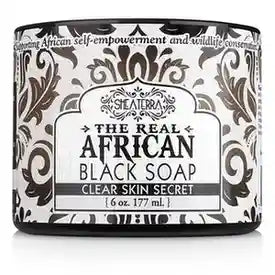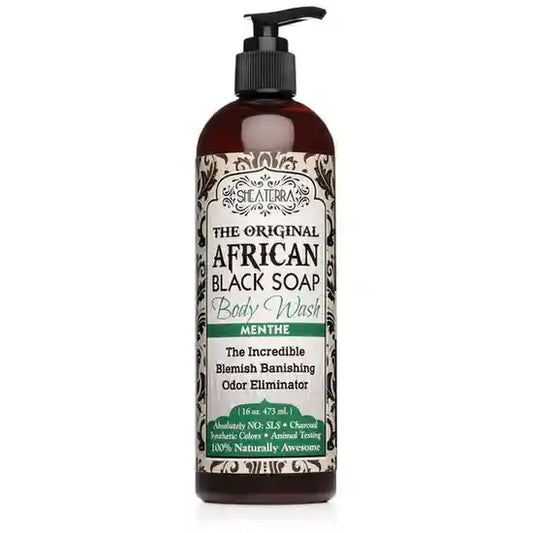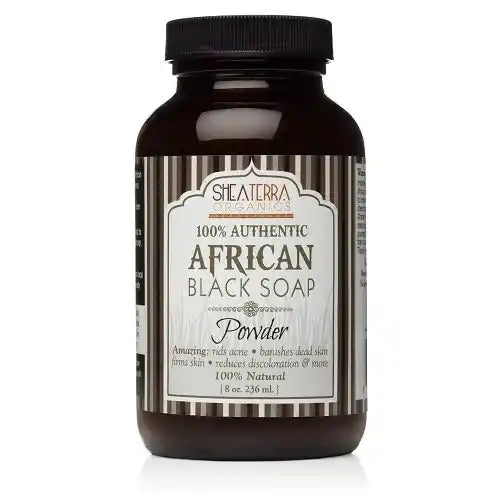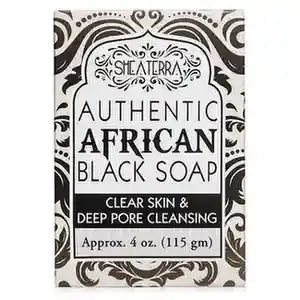
Who knew you could wash your skin with a clump of charcoal? I didn’t. Oh, hold on. You can’t! Rubbing charcoal all over ones skin would only end up in a disastrous mess that requires using soap or oil to remove it. In other words, charcoal DOES NOT wash skin. So then why have black soaps become so popular, and why has charcoal popped up in skin care everywhere? The answer lies in one ancient soap making form invented in West Africa perhaps thousands of years ago. AFRICAN BLACK SOAP.

What is African Black Soap?
African black soap is real soap. It is not a soap colored black with the use of charcoal to appear black. You’ve probably heard of the soap someone’s grandmother used to make. The method involved using the ashes of burnt wood, straining it through water and creating what we now call early lye soap. This early lye method has now been replaced by using lye created from positively charged salts. But in West Africa women are still producing an herbal soap using recipes passed down from generation to generation. The women burn local ingredients such as plantain peels, cacao pods and herbs into ashes. They then cook local oils of palm, coconut and sometimes shea butter into the ashes for several hours in large clay containers until the soap is black. This produces black powder. Once water is added to the powder soap is formed. Sometimes the women take the crumbles and cook water into it forming a paste similar to Play-Doh. This is real soap ready to use. Or they sell the soap in the powder/ crumble form. This allows the user to add their own water. Once water is added to the powder one has genuine soap. True African Black Soap is real soap. It does not need to be added to lye to become a soap as is the case with charcoal.

So Why the Charcoal Craze?
Being in the natural beauty industry for almost two decades at a time when selling natural products to people was near impossible, I have seen many beauty trends come and go. Charcoal products are one of those. It is my observation that charcoal based soaps and skin care products are a direct innovation of the popularity of African Black Soap. People began raving about the benefits African Black Soap had on getting rid of acne, getting rid of razor bumps and firming skin. The huge popularity of real African Black Soap and the difficulty to get the real thing led some to discover that if they add charcoal to soap the way we add African Black Soap to our soap bars, they could produce black soap and compete directly with African Black Soap. This trend continued to branch out into “detoxifying” face masks and creams.
True Story
I once knew a man in China who bought real African Black Soap from my supplier in Togo. He bought the soap several times. He would incorporate the soap into his soap bars. On one such order the supplier in Togo informed him that the money had been stolen. Sadly, the man might not have been lying. So he could not send the soap maker in China the black soap. The soap maker in China had developed a lucrative business selling his bars with black soap. So what he discovered is that adding charcoal to his bars of soap also made the soap black. Charcoal black soap products became an overnight success story.
There are fake “African Black Soaps” on the market. These are regular bars of soap dyed black (or a liquid one that is brown) masquerading as real African Black Soap so buyer beware. More on that in another article. Real African Black Soap grew in popularity when people discovered the amazing ability it has to free their skin from acne when all other products fail. So skin altering and life changing has real African Black Soap been for people that its popularity has now become a world-wide phenomenon. People first brought it over with them from West Africa along with their stashes of raw shea butter. Eventually it began to be sold by street vendors, in small shops and farmer’s markets. One can imagine the skewed faces people first had when being offered black clumps of putty to wash their faces with. The soap was often wrapped in butcher paper or sold in plastic containers. Before long two small body care companies took notice of the soaps popularity. The Bangladeshi and African owned companies contracted a US soap making company to produced artificially black colored soaps so they could start raking in big bucks on African Black Soap. Sadly these soaps do not produce the amazing results that real African Black Soap does, nor do their sales benefit the women who produce this soap in poor African villages. But one can imagine the recognition that “African Black Soap” received when stores like Target and Walmart began to sell these imposters.
African Black Soap
How It’s Made:
The women of the village collect plantain peels, cacao pods and other plant materials which are left over from food production. In large clay pots they char the material to make it black. They then cook local oils into the char like palm, coconut and shea butter. They might further add water to make the soap into a paste or sell the powder as it is.

The Benefits:
Genuine African Black Soap breaks down dead skin by dissolving the sebum layer that holds on dead skin. Not only does this make the skin firmer, fresher and younger looking, but it also evens discoloration due to hyperpigmentation and scarring. It kills bacteria which causes blemishes and acne. It has been proven to be one of the most effective products to reduce and prevent acne when all other products have failed. Because it breaks down layers of dead skin it prevents ingrown hairs and razor bumps. Purchases of real African Black Soap benefit women in villages who have no other means of making money for their families.

Charcoal Black Soap
How It’s Made:
Claims are that the charcoal is “activated” before adding to products. WebMD states: Common charcoal is made from peat, coal, wood, or petroleum. “Activated charcoal” is similar to common charcoal but is made especially for use as a medicine. To make activated charcoal, manufacturers heat common charcoal in the presence of a gas that causes the charcoal to develop lots of internal spaces or “pores”. These pores help activated charcoal “trap” chemicals. This activated charcoal is added to regular soap formulas to produce a black bar of soap. These soap formulas use modern soap making methods combining lye, water and oil to form soap.

The Benefits:
It is hard to separate the benefits of charcoal once added to soap because the nature of soap is to reduce blemishes, cut grease, etc. There are claims that charcoal soaps reduce acne. This is to be expected. Charcoal is usually used in natural soap formulas vs. common chemical based soaps. Natural soaps themselves are generally gentle and in themselves generally reduce blemishes when used instead of common chemical based soaps which are made from surfactants and irritating fragrances. How much acne fighting benefits are from the charcoal vs. the natural soap that the charcoal is added to is not known. I would believe that the charcoal does add some extra acne fighting benefits to natural soap as a detoxifying agent.
Conclusion:
Real African Soap is a completely herbal soap made without the use of lye. It foams and does everything that modern soaps do but does a lot more. African Black Soap can be used by itself for acne, blemishes, aging skin, and hyperpigmentation. Activated charcoal is not a soap but must be added to soap bases made from lye to create what is called black soap. The source of the charcoal is unknown and may contain petrochemicals. While activated charcoal might have detoxifying properties, in similar ways that it works to clean fish tanks, the effectiveness of the charcoal is reliant upon the lye based soap formula which it is added to. The charcoal soap is in essence only as good as the soap base it is added to. While it might enhance soaps natural blemish reducing properties, it works off the effectiveness of the soap itself.





